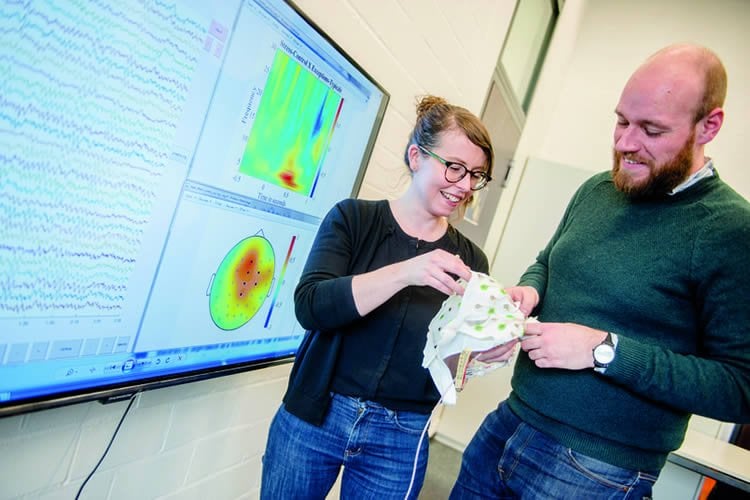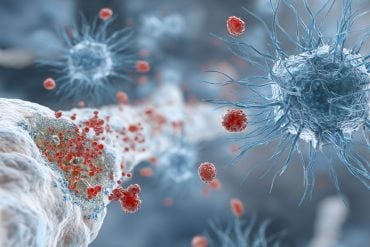Summary: A new study reveals how the brain manages to perform learned categorization while under stress.
Source: RUB.
When people have to assess a situation within seconds, it helps them to draw on learned categories. Psychologists from the Ruhr-Universität Bochum examined with the help of electroencephalography (EEG) how well category-learning works in a stressful episode. They published their research on a mechanism, the brain may compensate stress with, in the “Journal of Cognitive Neuroscience”.
Dr Oliver Wolf, Dr Nikolai Axmacher and Dr Boris Suchan from the Institute for Cognitive Neuroscience in Bochum joined their forces to conduct this study.
Ice water and a camera trigger stress
The researchers compared the performance of 16 stressed men with the performance of 16 relaxed men in categorisation learning. Half of the participants had to put their hands in ice water and were filmed, before they took the learning test – an accepted stress-test. The other half had to put their hand in warm water, without being filmed. “We decided to design our study with men only for now, because women tend to react differently to stress during their hormone-cycle,” says Marcus Paul, one of the authors.
During the test the participants had to divide different coloured rings by means of their colour scheme in two categories. They not only had to learn to assign typical objects, but also exceptions – rings, which differed from other rings in their category. Previous studies have shown that the brain regions that are crucial for learning exceptions are particularly sensitive to stress. During the test, the scientists measured the brain activity of the participants by EEG.
Different brain activity under stress
The stressed participants performed as well as the relaxed ones in the categorisation-test. But their brains showed an increased activity during the test and they used additional brain regions. The EEG of the stressed participants revealed increased activity in the theta-frequency above the medial prefrontal cortex, particularly when the participants learned the exceptions. Theta-waves reflect cognitive control mechanisms.

“We think, we have found a mechanism which allows us to give a good performance in a categorisation-test, even if we are stressed,” says Oliver Wolf.
In the next step the scientists from Bochum intend to analyse, whether the change in the neuronal activity of stressed and relaxed participants during the learning process affects their performance in a test conducted on the following day.
Funding: The research groups involved in the study belong to the Collaborative Research Centre 874 “Integration and Representation of Sensory Processes” which has been funded by the German Research Foundation since 2010. The interdisciplinary research network investigates how the brain processes sensory input into complex behaviour and memory.
Source: Oliver Wolf – RUB
Publisher: Organized by NeuroscienceNews.com.
Image Source: NeuroscienceNews.com image is credited to RUB, Marquard.
Original Research: Abstract in Journal of Cognitive Neuroscience.
doi:10.1162/jocn_a_01241
[cbtabs][cbtab title=”MLA”]RUB “How the Brain Might Compensate Stress During Learning.” NeuroscienceNews. NeuroscienceNews, 8 March 2018.
<https://neurosciencenews.com/stress-learning-8604/>.[/cbtab][cbtab title=”APA”]RUB (2018, March 8). How the Brain Might Compensate Stress During Learning. NeuroscienceNews. Retrieved March 8, 2018 from https://neurosciencenews.com/stress-learning-8604/[/cbtab][cbtab title=”Chicago”]RUB “How the Brain Might Compensate Stress During Learning.” https://neurosciencenews.com/stress-learning-8604/ (accessed March 8, 2018).[/cbtab][/cbtabs]
Abstract
Stress Elevates Frontal Midline Theta in Feedback-based Category Learning of Exceptions
Adapting behavior based on category knowledge is a fundamental cognitive function, which can be achieved via different learning strategies relying on different systems in the brain. Whereas the learning of typical category members has been linked to implicit, prototype abstraction learning, which relies predominantly on prefrontal areas, the learning of exceptions is associated with explicit, exemplar-based learning, which has been linked to the hippocampus. Stress is known to foster implicit learning strategies at the expense of explicit learning. Procedural, prefrontal learning and cognitive control processes are reflected in frontal midline theta (4–8 Hz) oscillations during feedback processing. In the current study, we examined the effect of acute stress on feedback-based category learning of typical category members and exceptions and the oscillatory correlates of feedback processing in the EEG. A computational modeling procedure was applied to estimate the use of abstraction and exemplar strategies during category learning. We tested healthy, male participants who underwent either the socially evaluated cold pressor test or a nonstressful control procedure before they learned to categorize typical members and exceptions based on feedback. The groups did not differ significantly in their categorization accuracy or use of categorization strategies. In the EEG, however, stressed participants revealed elevated theta power specifically during the learning of exceptions, whereas the theta power during the learning of typical members did not differ between the groups. Elevated frontal theta power may reflect an increased involvement of medial prefrontal areas in the learning of exceptions under stress.






